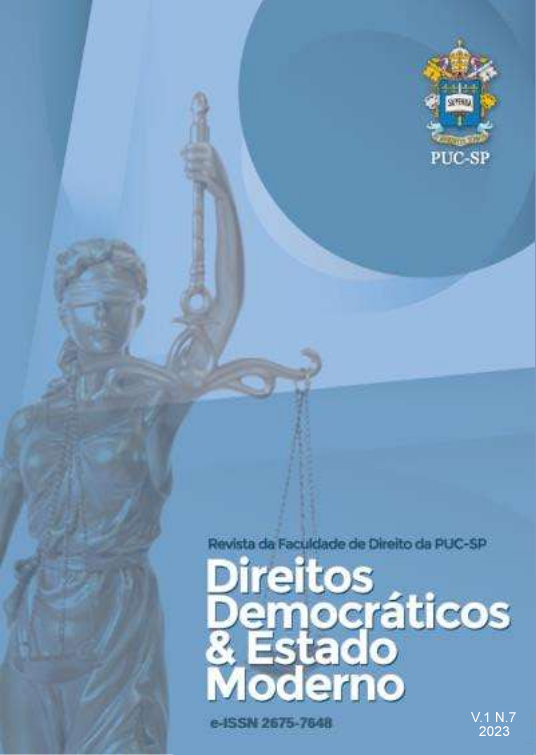Human rights and their social interfaces:
analysis of image records from marginalized actors
DOI:
https://doi.org/10.23925/ddem.v.1.n.7.59918Keywords:
Dignity, Human Rights, Rule of Law, Marginalized Groups, Ideology, Social SegregationAbstract
Human Rights (HR) constitute a fertile field of discussions in border areas of all scientific knowledge. Based on this assumption, this article aims to analyze imagery records of social actors seen as marginalized in the face of a relational structure in the light of HR. The Theoretical Foundation is housed in the interdisciplinary field of HR, especially about the interface between French Semiotics and the Sociology of Relations. Such theoretical strands, in turn, reverberate legal and ideological directions, with the aim of mapping the State's posture in the face of peripheralization analyzed in this work. The methodology is documental, since we analyze images extracted from the book “Holocausto Brasileiro”, by Daniela Arbex, a work seen here as a document. The approach is qualitative in nature, as the meanings generated from the data obey intersubjective criteria, which symbolize the sensitive look of researchers in the face of situations of semiotic problems in the corpus. The research reveals situations in which basic elements of survival are omitted from the lives of the social actors portrayed in the images. For HR, it is a vehemently violent measure in terms of the act of usurpation of social well-being, offered as a minimum condition of human dignity.
References
ARBEX, D. Holocausto Brasileiro. São Paulo: Geração Editorial, 2013.
BAKHTIN, M. Marxismo e Filosofia da Linguagem. São Paulo/SP: HUCITEC, 2006.
BAKHTIN, M. Estética da Criação Verbal. São Paulo/SP: HUCITEC, 2003.
BAKHTIN, M. Problems of Dostoevsky’s Poetics. London: University of Minnesota Press, 1984.
BAUMAN, Z. Vida para o Consumo: A transformação das pessoas em mercadoria. Rio de Janeiro: Editora Zahar, 2008.
BAUMAN, Z. Amor Líquido: sobre a fragilidade dos laços humanos. Rio de Janeiro: Ed. Jorge Zahar, 2004.
BERTRAND, D. Caminhos da Semiótica Literária. Bauru, SP: EDUSC, 2003.
BLOMMAERT, J. Ideologias Linguísticas e Poder. In.: SILVA, D. N.; FERREIRA, D. M. M.; ALENCAR, C. N. (orgs). Nova Pragmática: Modos de fazer. São Paulo/SP: Cortez, 2014. p. 67-77.
BORTONI-RICARDO, S. M. O professor pesquisador: Introdução à pesquisa qualitativa. São Paulo: Parábola Editorial, 2008.
BOURDIEU, P. O Poder Simbólico. Lisboa: Editora Bertrand Brasil, 1989.
CANÇADO, A. A. Tratado de Direito Internacional dos Direitos Humanos: Volume II. Porto Alegre: Sergio Fabris Editor,1993.
COMPARATO, F. K. A afirmação histórica dos direitos humanos. São Paulo, Saraiva, 2008.
DECLARAÇÃO UNIVERSAL DOS DIREITOS HUMANOS. Rio de Janeiro: UNIC, 2009 [1948]. Disponível em: < https://www.unicef.org/brazil/declaracao-universal-dos-direitos-humanos > Acesso em: 15 nov. 2022.
FAZENDA, I. Interdisciplinaridade -Transdisciplinaridade: Visões culturais e epistemológicas. In.: FAZENDA, I (org). O que é Interdisciplinaridade? São Paulo: Editora Cortez, 2008. p. 17-28.
GUIMARÃES ROSA, J. Primeiras Estórias. Rio de Janeiro (RJ): Nova Fronteira, 1962.
GUNTHER, L. E. et al. O Princípio da Dignidade da Pessoa Humana como Fundamento do Reconhecimento da Identidade Sexual como Direito de Personalidade: Análise da ADPF 527. Revista Direitos Democráticos & Estado Moderno, Faculdade de Direito da PUC-SP, v.2, n.5, p.37-50, Mai/Ago – 2022.
LAKATOS, E. M.; MARCONI, M. A. Fundamentos da Metodologia Científica. São Paulo: Atlas, 2013.
LANDOWSKI, E. Le Carré Sémiotique, Actes Sémiotiques-Bulletin, IV, 17, 1981.
LATOUR, B. Reagregando o Social: Uma introdução à teoria do Ator-Rede. Salvador/BA: EDUSC, 2012.
LATOUR, B. Como Fazer Ciência na Democracia. Trad. de Carlos Aurélio Mota de Souza. Bauru, SP: Edusc, 2004.
LATOUR, B. Ciência em Ação: como seguir cientistas e engenheiros sociedade afora. São Paulo: Editora UNESP, 2000.
MOREIRA, G. S.; FURLAN, F. M. Pode a Intercultura superar o Multiculturalismo? Revista Direitos Democráticos & Estado Moderno, Faculdade de Direito da PUC-SP, v.3, n.6, p.45-61, Set/Dez – 2022.
MORIN, E. Introdução ao Pensamento Complexo. Porto Alegre: Editora Sulina, 2011.
MORIN, E. Ciência com Consciência. Rio de Janeiro: Bertrand Brasil, 2005.
MORIN, E.; CIURANA, E. R.; MOTTA, R. D. Educar na Era Planetária: O pensamento complexo como método de aprendizagem no erro e na incerteza humana. São Paulo: Cortez Editora, 2003.
PEREIRA, B. G. Semiótica Discursiva e Linguagem Televisiva: Efeitos de Sentidos em Textos Sincréticos. Revista Acadêmica Digital, v. 45, p. 1-11, 2022.
PEREIRA, B. G.; ANGELOCCI, M. A. Metodologia da Pesquisa. Pará de Minas (MG): Editora VirtualBooks, 2021.
RAMOS, A. de C. Curso de Direitos Humanos. São Paulo: Saraiva. 2015.
SARTORI, T. L. Políticas Públicas, Educação para os Direitos Humanos e Diversidade Sexual. Práticas Educativas, Memórias e Oralidades. Rev. Pemo, v. 3, p. e335484, 2021.
SÁ-SILVA, J. R. et al. Pesquisa Documental: Pistas teóricas e metodológicas. Revista Brasileira de História & Ciências Sociais, Ano I, n. I. 2009.
SEVERINO, A. J. Metodologia do Trabalho Científico. São Paulo: Cortez, 2007.
Downloads
Published
How to Cite
Issue
Section
License
Copyright (c) 2023 Democratic Rights & Modern State

This work is licensed under a Creative Commons Attribution 4.0 International License.
This work is licensed under a License Creative Commons Atribuição 4.0 Internacional.
The authors grant the journal all copyrights relating to the published works. The concepts issued in signed articles are the absolute and exclusive responsibility of their authors.
DD&EM Magazine - ISSN 2675-7648

















